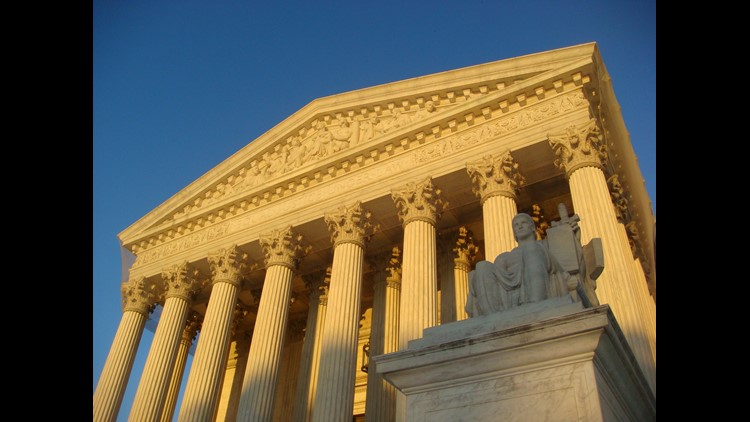WASHINGTON,DC — The Supreme Court ruled on several cases Monday, involving, redistricting, government officials and gun ownership.
Guns and domestic violence
The court ruled Monday against a Maine resident who argued he should not have been stripped of his ability to possess a firearm despite a prior domestic violence charge in state court.
Stephen Voisine pled guilty to a misdemeanor assault charge in 2004 against a girlfriend. Five years later, he was investigated for shooting a bald eagle and as part of the investigation he turned over a firearm to authorities.
After reviewing his criminal record, Voisine was then charged with unlawful possession of a firearm pursuant to a federal law which makes it unlawful for a person who has been convicted of a “misdemeanor crime of domestic violence” to possess a firearm or ammunition.
Lawyers for Voisine argued that his misdemeanor offense did not rise to the level to trigger the federal law.
The justices agreed to take the case to interpret the reach of a federal statute. But Justice Clarence Thomas during oral arguments was also interested in the 2nd Amendment implications, breaking in to ask a series of questions for the first time in 10 years during oral arguments.
The three-judge panel of the 1st U.S. Circuit Court of Appeals ruled against Voisine and another defendant, holding that the “question before us is a narrow one.”
Congress recognized that “guns and domestic violence are a lethal combination,” the panel said.
Virginia Governor wins appeal
The Supreme Court on Monday unanimously threw out the conviction of former Virginia Gov. Bob McDonnell.
The 8-0 decision leaves open the possibility McDonnell can be retried, but his current conviction is vacated.
McDonnell, once a rising star in Republican politics, was convicted on federal corruption charges in 2014. He was found guilty of violating the law when he received money and loans from Jonnie R. Williams, the CEO of a Virginia-based company, in exchange for official acts. The case centered around the question of what constitutes the scope of an “official action” under federal corruption law.
Writing for the court, Chief Justice John Roberts set a clear definition of that term and how it can be used in corruption convictions.
“In sum, an ‘official act’ is a decision or action on a ‘question, matter, cause, suit, proceeding or controversy,” Roberts wrote. “Setting up a meeting, talking to another official, or organizing an event (or agreeing to do so) — without more — does not fit that definition of an official act.”
Detroit mayor’s case declined
The court has declined a request by former Detroit Mayor Kwame Kilpatrick to overturn his corruption conviction and 28-year prison sentence.
The court announced its decision not to review the case Monday. The Associated Press left a message seeking comment from a lawyer for Kilpatrick.
Kilpatrick’s request was made after a federal appeals court said in October it had no interest in taking a second look at the case.
In 2013, Kilpatrick was found guilty of two dozen crimes, including tax evasion and bribery. A three-judge panel of the 6th U.S. Circuit Court of Appeals in August affirmed the conviction.
Kilpatrick’s appeal centered on an alleged conflict among his trial attorneys, among other very technical reasons. He quit office in another scandal in 2008 and is federal prison.
Justices to review ruling on NC congressional districts
The Supreme Court will consider North Carolina’s appeal of a court ruling that said state lawmakers relied too heavily on race in drawing congressional districts.
The justices on Monday added the case to their calendar for the fall.
A panel of three judges struck down two majority black congressional districts and ordered the state to redraw its congressional map.
North Carolina did so and held primaries in the reconfigured congressional districts on June 7.
Voters challenged the new districts as well, but the same judges allowed the primaries to take place.
The case is McCrory v. Harris, 15-1262.
Information from the Associated Press is included in this story.



